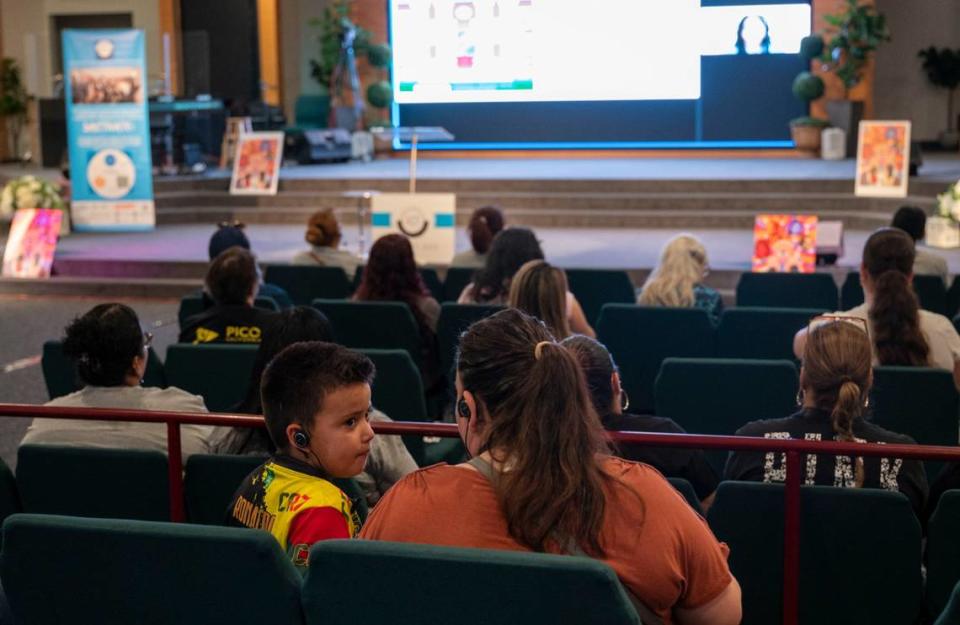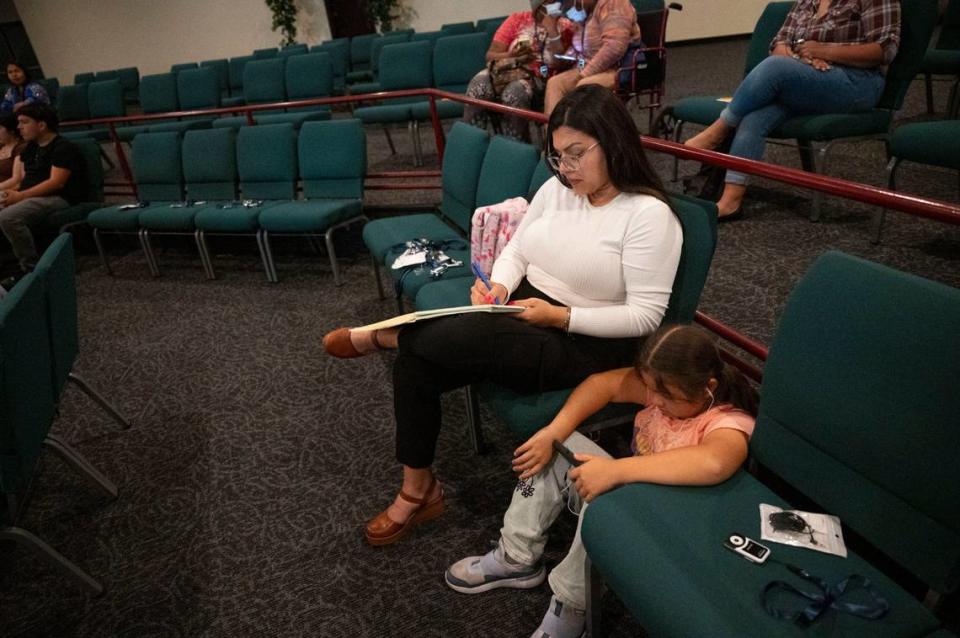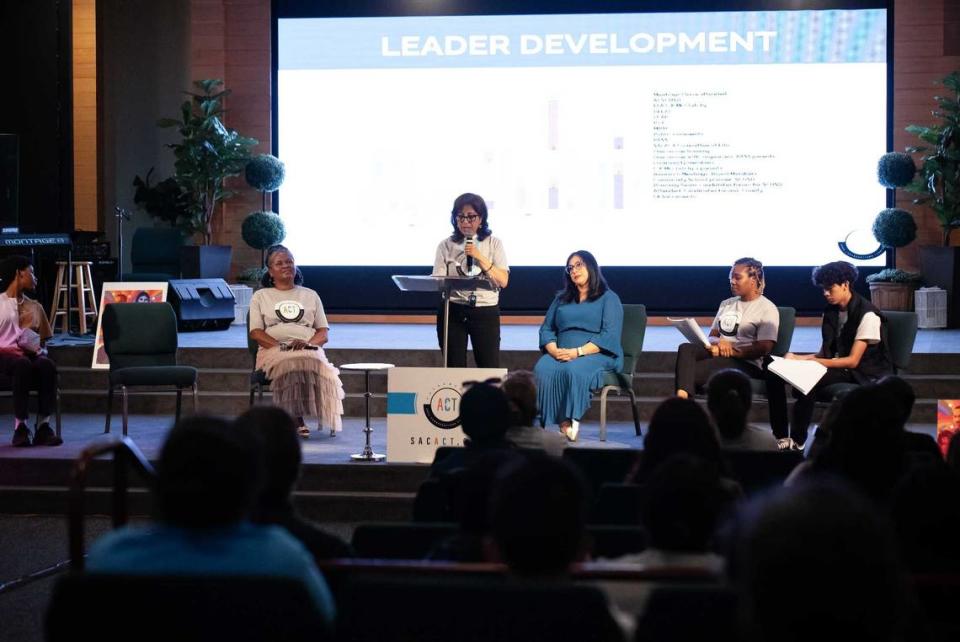The eldest of six siblings, Martha Pulido was raised by two primarily Spanish-speaking parents who emigrated from Mexico. Despite their efforts to support their children’s education, navigating the system proved challenging due to the language barrier.
Pulido, a bilingual mother of a fourth- and first-grader, hoped this would never happen to her. But when she vowed two years ago to become more involved in raising her two children, the Sacramento mother didn’t know where to start.
Until then, Pulido’s involvement was limited to the usual back-to-school evenings and open house meetings with teachers. She longed to learn more about school community councils, English learner advisory committees, and parent-teacher organizations.
“I didn’t know about these things because our parents who don’t speak English don’t get involved,” Pulido said.
Two years later, Pulido is a leader in a group of Latina, mostly monolingual mothers, advocating to improve student achievement in the Sacramento City Unified School District. The group, called the Comité de padres, or parent committee, came together through a statewide grant intended to create “community schools.” The education model, which has received renewed attention and support during the COVID-19 pandemic, addresses a range of student and family needs.

Community schools offer a range of on-campus assistance, including health and mental health services, tutoring and other social services. Teachers are encouraged to increase the cultural relevance of their lessons and promote a sense of belonging among students. And parents play a more important role in the decision-making process.
But parent involvement is an especially difficult part of the equation for communities of color, said Lucero Soto, a community organizer for the Sacramento Act, the faith-based organization that facilitated parent outreach for a community college-focused grant for the entire state. These families are neglected in education due to systemic barriers, such as language access and poverty, Soto added.
“They (families) don’t really know their role or power,” Soto said.
That’s why Pulido and the other Spanish-speaking mothers want to bring about change.
While enjoying pan dulce and coffee, they discuss ongoing issues at their children’s schools and the best way to address them. The monthly meetings hosted by the Sacramento Act provide parents with an opportunity to vent, give each other advice, and ultimately empower themselves to become leaders in education.
“We just created a safe space for them,” Soto said. “And I think that’s what’s missing in our schools.”
Expansion of Community Schools in Sacramento
Sacramento Act and Moms, like Pulido, are part of a $4.1 billion statewide effort to expand community schools. Research from the Learning Policy Institute, a Palo Alto-based nonprofit, shows that community schools help increase student attendance, behavior and academic achievement.
According to the national Coalition for Community Schools, there are about 5,000 such schools nationwide. Notable examples include community schools in East Oakland and East Los Angeles, areas composed primarily of poor black and Latino neighborhoods.
California lawmakers looking to expand the effort approved an initial round of funding for 268 counties in late 2022. Sacramento Unified School District received $25.4 million, which would be distributed among 18 schools over six years.
Given the community partnerships, Sacramento Act was asked by the district to conduct a needs assessment on the first cohort of six schools. The assessments consisted of one-on-one conversations with fifty mostly Spanish-speaking parents, with the vast majority expressing the need for better communication between schools and families.


In California, 40% of elementary school students speak a non-English language at home, according to the Public Policy Institute of California.
“Access to languages is a huge barrier,” said Alma Garcia, a 56-year-old monolingual Spanish speaker. “Parents like us have less access and opportunity than someone who speaks English.”
Garcia, a mother of three, joined the group about a year and a half ago in hopes of improving her relationships with her children’s schools, teachers and administrators. She was one of a handful of Sacramento mothers who cited a general distrust of the education system as a whole.
“We hear that families don’t want to participate, but that’s not true,” Soto said. “But the question is: how do we show that?”
The first step is rebuilding trust between families, said Elvia Vasquez, a community organizer with the Sacramento Act and a longtime advocate for community schools.
“Parental decisions are critical to making community schools work,” she says.
To gain parental support, the Sacramento Act created a working group of about a dozen mothers. The group has since evolved into the Comité de Padres and has grown to approximately 30 mothers.
Their meetings provide opportunities to better understand the daily struggles of families in Sacramento schools and provide parents with the right information.
But most of all, Vasquez says, the meetings are crucial for building trust with families who have felt overlooked for years. This approach allows families to embrace the schools and their child’s learning, and hopefully ultimately create a culture of parental involvement that goes beyond grant funding.
“These schools that are receiving funding are not going to continue to receive it forever,” Vasquez said. “This is just to get them started and eventually they will have to support themselves. … Parental involvement is crucial.”
A ripple effect of change
While the concerned mothers joined this group for the betterment of their children, they have also seen changes in themselves.
Garcia credited the group with improving her social skills and self-confidence. She pointed to small triumphs in her life, like the fact that she now feels comfortable driving to late-night meetings and practicing her English speaking skills. Garcia is also motivated to help other parents who were in the same situation as her two years ago.
“I just don’t want to improve my kids’ schools,” Garcia said. “I want to improve the schools for all students.”


Pulido echoed Garcia’s sentiments, saying her involvement helped her overcome the fear of public speaking.
Both Pulido and Garcia spoke at a town hall meeting last week on the Sacramento Act, which focused on community schools.
“Through my enthusiasm and dedication, I now see how important it is to contribute to improving our schools and community,” Garcia told a crowd of about 60 people at South Sacramento Christian Church.
Soto cited the two Latina mothers as examples of what her organization is trying to accomplish. Parents, along with teachers and administrators, should lead the conversations about education. A community school welcomes the leadership and decision-making of parents like Pulido and Garcia.
“They show other parents that they can do it too,” Soto said. “Other parents, Latinos, mothers who only speak Spanish, see themselves in them.”





